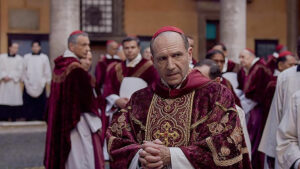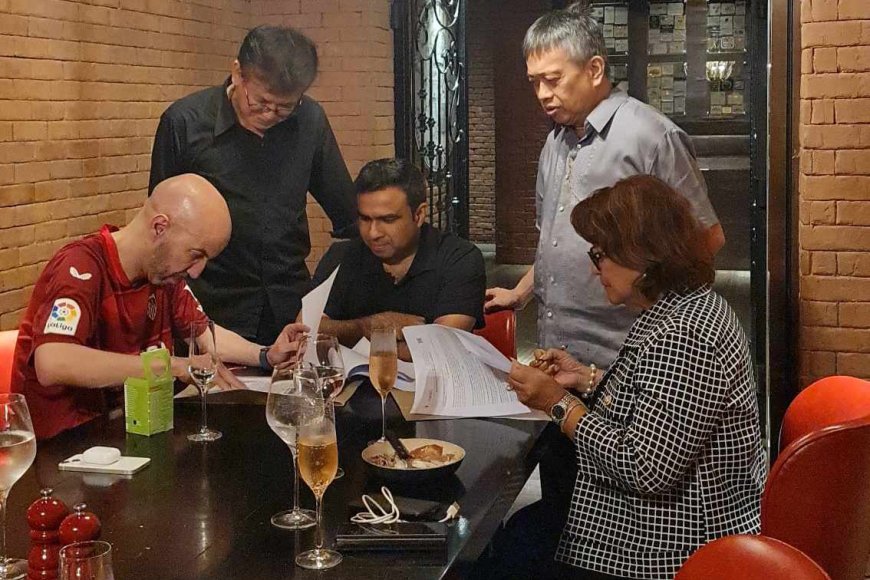Succession
EDWARD BERGER’S Conclave is more fun than the process of choosing a world leader has any right to be.

Movie Review
Conclave
Directed by Edward Berger
EDWARD BERGER’S Conclave is more fun than the process of choosing a world leader has any right to be.
Adapted from the novel by Robert Harris, it outlines the death of a pope, and the power struggles involved in electing the next one, and as one watches the proceedings and the skullduggery, several thoughts arise:
1.) This is the most blatant (and blatantly beautiful) advertisement of the pomp and pageantry of the Roman Catholic Church since well The Exorcist back in 1973. Oh we’ve had dramas about priests — mostly sexual abuse scandals and lurid exorcisms — and there’s Meirelles’ The Two Popes which is more earnest biographical drama than anything actually entertaining. But Berger manages to fashion a smooth ticking mechanism, the jeweled gears and precision movements of a handmade mystery thriller set against the splendor of the Sistine Chapel’s ceiling (expertly reproduced in the soundstages of Cinecitta), or along the hallways and stairways of the Domus Sanctae Marthae (designers admit to rejiggering the humdrum original into something more like an ultramodern penitentiary; perfect setting, I thought, for a Dario Argento giallo). In this severe environment the cardinals — often dressed in what looks like a collaboration between David Cronenberg and Margaret Atwood — sit and scribble names on their paper ballots, fold said paper, walk up to a silver urn, intone a solemn prayer declaring they are voting for whom God would want them to vote for (Testor Christum Dominum, qui me iudicaturus est, me eum eligere, quem secundum Deum iudico eligi debere), drop their votes in the hole.
When they dine they dine simply, but the food — soups, pastas, a three-tiered tower of superb looking fruit — is of high quality. Wine is served, an apparently inexhaustible amount; likely not expensive but knowing Italian wines (and knowing priests), also very good. Cigarettes – I’ve seen more smoking here than in any half-dozen recent films; even spotted the occasional cigar (Cuban?). Life sequestered in this conclave looks simple but comfortable, and you have the Vatican Guard posted outside to guarantee your peace and quiet. No wifi — a serious drawback — but you are allowed pen and paper (admittedly I have not written anything of length by this method in decades). All things considered I could get used to this kind of life.
2.) Most of the drama consists of old white men huddled and debating who to pick. I know I know, in an age where even MI6’s double-O section and The Avengers have been compelled to allow member of varying races and sexual orientations into their ranks, the Catholic Church remains stubbornly antediluvian — but you begin to see the point when you listen to these folks, their bickering and politicking and prejudices, and you think: maybe the problem isn’t the field of candidates to pick from, the problem is this college of corrupt wizened mandarins tasked to pick a candidate.
That all said, if we’re going to cast old white men for the leads we could do a lot worse than Ralph Fiennes, Stanley Tucci, John Lithgow, and Sergio Castellitto, plus Isabella Rossellini on standby in her best Bells of St. Mary habit, ready to chime in at the crucial moment. With Harris’ crackerjack plot to play with, with witty lines fashioned by Harris and screenwriter Peter Straughan, with Berger and his production team (including cinematographer Stephane Fontaine’s sombre Gothic color palette and Suzie Davies’ minimalist sets and Lisy Christi’s richly textured costumes) ready to raise up a hushed cloistered world around them, who could resist the offer to deliver a memorable performance?
3.) The plot is stuffed with unlikely coincidences and climaxes with an explosion as perfectly timed as a punchline (you can’t help but laugh in response); plus you could spot the finalist coming from literally miles away. Which matters less than you might think — Berger keeps the plot humming, and it’s engaging enough and plausible enough and deadpan funny enough that you’re entertained anyway.
Each of the primary candidates have their privileged moment, and I especially appreciate that of Lucian Msamati as Cardinal Adeyemi of Nigeria, who never looked more magnificent than when he is being humbled; Ralph Fiennes as Cardinal Lawrence plays ringmaster to these confessions and revelations like he’s both eyewitness and impresario (at one point when Lawrence is accused of the sin of ambition — an accusation made more than once — the priest blinks, as if not sure which persona should respond). Poor Castellitto may not have been as well served by his privileged moment, when after the bombing attack he stands up to declare the church must fight back; the xenophobic overtones are a tad too obvious and the response, though well-delivered in a soft-spoken manner, is almost just as blatant.
4.) I mentioned predictability but the twist near the end of the picture is genuinely startling, and perversely entertaining. Each candidate’s major flaw (they’re human, it’s part of the package) is picked apart and used against them; one flaw does manage to stand out as a reflection of both the candidate’s character and the church’s — what said flaw has to do with the candidate’s actual qualifications versus the church’s ideas of what those qualifications should be.
5.) The bomb serves to remind the cardinals — and us — of the world outside of the conclave, that everything the cardinals argue feverishly over — tradition vs reform, corruption, sexuality, loyalty, betrayal — all involve issues within a 2,000+ year old institution that is struggling to find its relevance in this digitally demented world. So, the church may (or may not) have chosen its new Holy Father, fine; what’s next? That’s when the real story begins.
Conclave opens in Philippine theaters on Nov. 20 with an MTRCB rating of PG.























